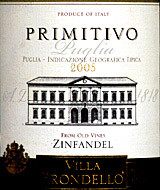Is it Zinfandel, or is it Primitivo? Oddly, the Italian red wine we feature today is <i>both[/i], if its label is to be believed: The Italian Primitivo gets top billing, but the bottom of the label, in fair-size print, reads (in English), "From Old Vines Zinfandel."
How's that?
What we have here is a case of grape science catching up with reality, while bureaucracy lags behind.
Zinfandel, long called a "mystery grape" because it seemed to appear from nowhere in California Gold Rush days, hyped by a promoter named Agoston Haraszthy, who claimed that he had brought the rare grape to California from his native Hungary. In fact, Haraszthy certainly exaggerated his role: Zinfandel (sometimes rendered "Zinfindal," "Zierfandler" or "Zeinfindall") was well-known in the Eastern U.S. as a table grape long before Haraszthy set foot in Napa. It had turned up in a horticultural fair in Massachusetts as early as 1834.
Also, based on similarity in the grape and its leaves and the wine it made, Zinfandel for many years was thought to be a sibling of the Southern Italian Primitivo of Puglia.
It was only as recently as 2001 that modern grape sleuths, including Dr. Carole Meredith of the University of California at Davis, used DNA technology to confirm that Zinfandel and Primitivo are the identical grape, albeit different clones; and the same is true of the little-known Crljenik Kasteljanski of Croatia, which is now thought to be the original variety, exported to Italy as Primitivo and to the U.S. as Zinfandel.
Based on this evidence, the European Union moved quickly to permit Italian producers to use either "Primitivo" or "Zinfandel" (or, as in the case of today's wine, both) to label wines made from either grape. The move makes great sense for Italy, as Zinfandel is immensely popular in the U.S. and more likely to sell wine exports than the relatively unfamiliar Primitivo.
U.S. regulators, on the other hand, have been slower to approve legal changes. The name Primitivo is now permitted for U.S. wineries (such as Rabbit Ridge) making wine from the Primitivo clone; but in contrast with European rules, American wineries may not use the names Primitivo and Zinfandel as synonyms. A proposal to allow this has been on the books since 2002 but has not been acted upon, reportedly because of opposition by Zinfandel producers who aren't excited about the possibility of competition.
Meanwhile, because the U.S. has signed off on the European labeling laws, this results in a curious situation in which European wineries may call Primitivo "Zinfandel" in U.S. sales, but American wineries may not.
Frankly, and probably more because of differences in wine-making styles than in fruit or <i>terroir[/i], I have rarely found Primitivo and Zinfandel all that similar. There's often a berry-like character in both, but differences typically fall acros the usual Old World-New World lines, with most Zins landing on the big fruit, high-alcohol side, while Primitivo tends to lower alcohol and hints of earth, plus a whack of oak if the producer wants to impress the critics.
Today's wine hits a pleasant happy medium. Frankly, despite the "Z word" on the label, I don't know that I would have called it as a Zin or a Primitivo in a blind tasting. But I like its balanced presentation of berrylike fruit and subtle earth and its appropriate but not over-the-top 13 percent alcohol, all of which make it a better food wine than many a "monster-style" Zin.
 Villa Brondello 2005 Primitivo Puglia "From Old Vines Zinfandel" ($11)
Villa Brondello 2005 Primitivo Puglia "From Old Vines Zinfandel" ($11)Inky blackish-purple with a thin violet edge. Aromas reminiscent of Zinfandel but throttled back, black raspberries and a more winey hint of Chambord raspberry liqueur with a faint earthy back note. Black fruit flavor held up with crisp acidity and marked tannins; 13 percent alcohol makes it relatively lightweight compared with its New World cousins, but I like it the better for that. U.S. importer: Scoperta Importing Co. Inc., Cleveland Heights, Ohio. (April 5, 2008)
FOOD MATCH: A natural with a simple dinner of spaghetti and meatballs.
VALUE: Hard to beat at just over $10 in today's economy.
WHEN TO DRINK: The good combination of fruit, acidity and tannins suggests at least modest aging potential, but it's really meant to drink up, particularly since the track record for synthetic corks in cellaring remains doubtful.
FIND THIS WINE ONLINE:
Check prices and find limited vendors for Villa Brondello's wines on Wine-Searcher.com:
http://www.wine-searcher.com/find/Brond ... g_site=WLP
U.S. readers may be able to get more information about local distributors from the importing company, Scoperta, in Cleveland Heights, Ohio.
http://www.tmarchettico.com/contact.html

